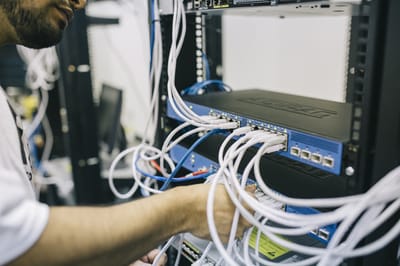WE CONNECT SA
connecting people connecting business
About

WE CONNECT SA has over 45 years’ experience in the industry, in which we have mastered the technology and built a successful, market-leading business on strong values and by offering the highest quality of work using the most up-to-date technology available.
- Business-to-Business VoIP specialists
- Hosted PBX solutions
- Expertly configured systems and call cost savings
- The determination to help your business make the most of cloud-hosted and all the other components of a unified communications system.
- A dedicated and top-notch team of engineers and remote support crew ready to assist
- 5-star before and after customer service
WE CONNECT SA is a 100% South African owned and operated telecommunications provider, with a diverse range of organizations that have put their trust in us to deliver their end-to-end voice, data, chat and video traffic. From one-person to multinational operations, including Regional Councils, professional firms, accommodation chains, healthcare providers and large corporates, WE CONNECT SA is working 24/7 to keep everyone connected.
Your installation will be quick and straightforward, with an interface that your IT team can manage without messy configurations and guesswork. We smoothly integrate with your IT architecture and provide a unified communications solution that works without compromise. No more dropped calls, patchy quality or poor functionality.
With our serious commitment Service Level Agreements, WE CONNECT SA proudly partners with IT companies who require market-leading VoIP systems.
Our focus is for every user in every organization to complete every call they make, every time.
WE CONNECT SA
Where the people make the difference
TELECOMS
Today’s business environment relies upon constant connectivity. Your business can have the most advanced facilities or production equipment in the world, but without a telecommunications network to provide connectivity to the world around it, your business may struggle. A telecommunication network makes it possible for your employees to access business emails on a mobile phone while traveling for business, enable video conferencing in the office with clients around the world, while providing telephone service in your local area.
Telecommunications systems are easily taken for granted. Every day your employees come and go from the office with the assumption that when they want to make a call, access email or conduct research online, they’ll be able to do so.
The difference between a PBX and PABX is quite simple. A PBX is a “ private branch exchange,” while a PABX is a “ private automatic branch exchange.” The only difference is the word “automatic.”
The difference goes back to the history of telephone systems. Originally, a PBX required switchboard operators to connect internal callers to other lines. Operators did this manually by literally unplugging lines and plugging them into the right extension.
The PBX was already an advancement over the original “plain old telephone system” (POTS) which required individual lines for each desk in an office. To dial another desk was just like making an outbound call. Outside callers had to know which number to call directly. No call transfer capabilities, conference calls or voicemail. The ability to connect two office extensions, transfer a caller to a colleague or share a single access number for a business was already a big deal, even if it was manual.
When electronic switching became available, the automatic telephone system was born - the PABX. Users were able to dial an extension number to make an internal call without the need for an operator. It would be rare to find telephone systems without this feature. So, the reality is that every PBX today is actually a PABX.
The question is: Is there any real difference in the terms?
Many people observe that since non-automatic PBXs really don’t exist anymore, the terms are interchangeable. While this is true, in practice it’s good for businesses to keep paying attention to new automatic features available for phone systems.
Scalability
Because there is no up front purchase of fixed or limited size PBX equipment, the users VBX system is able to grow as the business grows. VBX allows you to expand or contract as your business changes without having to be burdened by existing equipment. Voice Lift's VBX system also allows for more time and cost efficient addition of incoming lines and/or extensions.Lower Front End Costs
The VBX Virtual Branch Exchange is an economical alternative to purchasing costly PBX equipment that requires constant maintenance. Our pricing structure is very simple. There is a one-time setup charge, and there is a monthly charge for the number of seats you require in excess of the number of lines you have.Continuous Upgrades
The VBX system is constantly upgraded to provide the latest features and functionality. Voice Lift's VBX customers receive these upgrades FREE of charge, so you know that you are always on the cutting edge of telecommunications technology.Services

FIBRE
Today’s business environment relies upon constant connectivity. Your business can have the most advanced facilities or production equipment in the world, but without a telecommunications network to provide connectivity to the world around it, your business may struggle. A telecommunication network makes it possible for your employees to access business emails on a mobile phone while traveling for business, enable video conferencing in the office with clients around the world, while providing telephone service in your local area. Fibre optic internet has a variety of benefits compared to its copper counter-part. The symmetric speed of fibre is stable and fast, allowing for quick download and upload of content. This makes your business run smoothly and your leisure time buffer free! Speed Fibre-optic internet is many times faster than regular high-speed copper internet. Giving you constant speeds for you to surf the web, watch movies and run a business. Unlike its dial-up or wireless counterpart, fibre-optic internet has “symmetric speed”, meaning that the upload and download times are the same. This allows you to upload photos and stream movies at the same pace. Reliabilitiy Other benefits fibre-optic has over copper internet connectivity is that fibre cables are much stronger than copper. Copper cables decay and degrade over time resulting in spotty connections and loss of signal. Fibre-optic cables transfer data through a glass or plastic tube, which is resistant to electrical or human interference, unless physically cut. Signal Strength Unlike traditional DSL or ethernet over copper internet, fibre-optic signal does not degrade over distance. Bandwidth Stop “hitting the cap” on your bandwidth with fibre-optic internet. As higher demands are put on your network, speed won’t be likely to stutter. Latency Unlike its competitors, fibre-optic internet offers little to no latency over an internet connection. Fibre eliminates latency issues you would experience while downloading or uploading high definition content.

SECURITY, ACCESS CONTROL
Access control systems will generally offer an ONVIF type video stream and/or an integrated CCTV system solution. Whilst ONVIF provides a video feed that can be seen within an access control software platform, there is no association of door events to CCTV images. A fully integrated connection as with the EntroWatch access control platform and HIKVision CCTV system provides a fully automated approach and one that is easier to use in an emergency such as a forced entry and attempted break-in. A further enhancement is integration with external security barriers and a perimeter intrusion detection system (PIDS). If external CCTV cameras are also deployed outside the building to cover strategic access and remote points, alarm events from the PIDS system for example can also be automatically associated with CCTV images to provide a fully comprehensive building security system.

HOSTED PBX
Hosted PBX (Private Branch Exchange) is a virtual telephone system that allows you to connect to your phone system via the Internet connection. In the past, many businesses used a traditional PBX setup: a private telephone network that allowed employees to make and receive calls using traditional landlines. Hosted PBX systems allow businesses to communicate wherever they have the Internet connection using a technology called VoIP (Voice Over Internet Protocol) for a fraction of the cost of these traditional PBX setups. A good analogy would be how email has replaced traditional mail. Hosted PBX has superseded PBX: it’s more reliable, convenient, cheaper, and available 24/7. Why should your business invest in a hosted PBX setup? There are a number of benefits that come with switching to a hosted PBX system. Some of these include: Mobility Hosted PBX systems allow users to work remotely, as long as they have the Internet connection. Employees can just log into the system via their phone, tablet or computer. This is particularly useful as many businesses have had to transition to working remotely due to the COVID-19 pandemic. Reliability Hosted PBX system will ensure that your phone system is always operational. You no longer need to worry about downed lines or missing voicemails, because the system is run in a reliable data centre which is monitored 24/7. Cost Savings Hosted PBX system is a much more efficient way to run a phone system. Rather than having to purchase and maintain expensive hardware, you simply pay a monthly fee for the hosted PBX system, which is much less expensive than a traditional phone system. Convenience Hosted PBX systems come with a number of features that help to keep your business running smoothly. Some of the most common features include voicemail to email, call forwarding, call logs and more. Cloud vs virtual vs hosted PBX What's the difference between hosted PBX, cloud PBX and virtual PBX? Frankly speaking, there's no difference, that's all the same name of the same technology. In some countries one name is more popular than the other or a provider prefers one over the other. The main meaning is that PBX is no longer a physical entity but a technology that is used via the Internet, that's why it can be called either virtual, cloud or hosted PBX. Conclusion A hosted PBX system is a convenient tool for organising day-to-day communications within and outside your business. It allows the productive structure of distributing calls between staff members, compiling information about customers and increasing the productivity and efficiency of your workflow.
EXTRA SERVICES

SOLAR
SOLAR ENERGY Solar energy is the most abundant of all energy resources and can even be harnessed in cloudy weather. The rate at which solar energy is intercepted by the Earth is about 10,000 times greater than the rate at which humankind consumes energy. Solar technologies can deliver heat, cooling, natural lighting, electricity, and fuels for a host of applications. Solar technologies convert sunlight into electrical energy either through photovoltaic panels or through mirrors that concentrate solar radiation. Although not all countries are equally endowed with solar energy, a significant contribution to the energy mix from direct solar energy is possible for every country. The cost of manufacturing solar panels has plummeted dramatically in the last decade, making them not only affordable but often the cheapest form of electricity. Solar panels have a lifespan of roughly 30 years, and come in variety of shades depending on the type of material used in manufacturing.
Learn More
FIRE DETECTION
Fire detection systems are designed to discover fires early in their development when time will still be available for the safe evacuation of occupants. Early detection also plays a significant role in protecting the safety of emergency response personnel. Property loss can be reduced and downtime for the operation minimized through early detection because control efforts are started while the fire is still small. Most alarm systems provide information to emergency responders on the location of the fire, speeding the process of fire control.
Learn MoreContact
- Port Elizabeth, Eastern Cape, South Africa